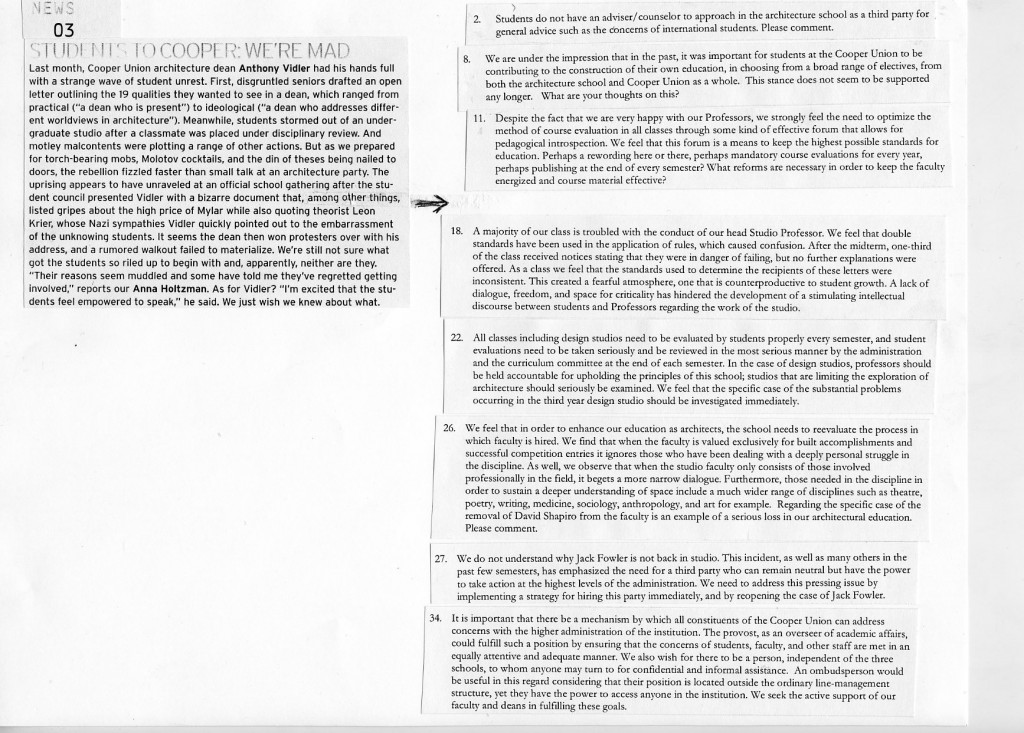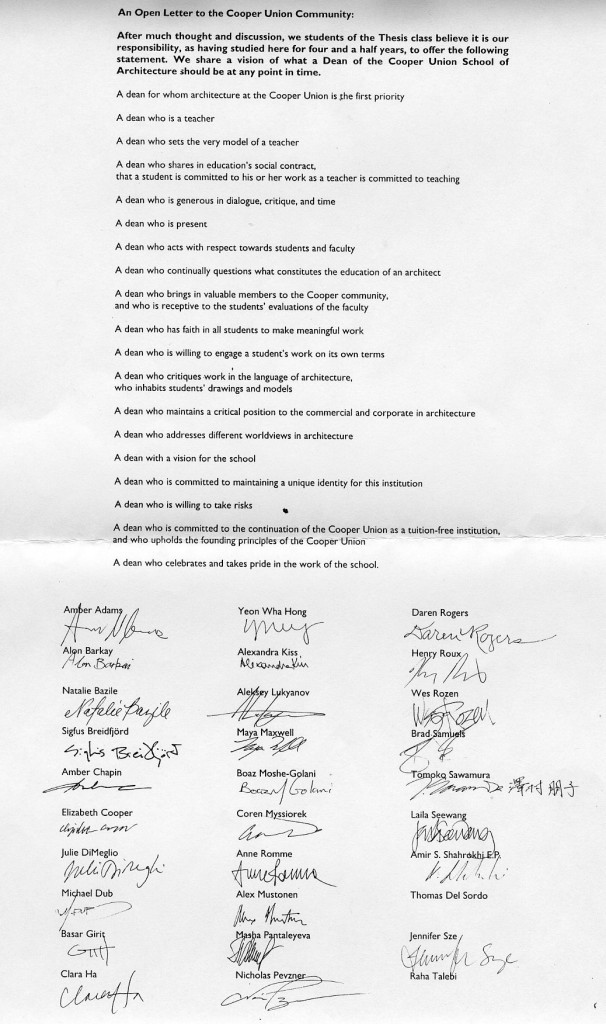In February 2005, students walked out of the school as a form of protest.
The thesis students at The School of Architecture wrote a statement open to the Cooper Community (I have a copy the letter with me but it is not dated). In this letter they stated nineteen points of how they envisioned a dean. Point eighteen reads:
“A dean who is committed to the continuation of the Cooper Union as a tuition-free institution, and who upholds the founding principles of the Cooper Union.”
The dean The School of Architecture was Anthony Vidler.
A few days after the walk out, the Students council, Irwin S Chanin School of Architecture wrote:
“An invitation to the voyage”,
Following the walking out of students.
Prepared by the students
Printed 2005 02 15
On page 11, they addressed Student Fees:
“ When Peter Cooper established The Cooper Union, he did in order to provide a tuition-free education for young people. Over the last years, the student-fee has risen, in order to compensate for the financial troubles of the institution. Students have continually opposed the increases and understand the fee is a contradiction of what Peter Cooper…The president response was that an inexpensive education is better than an expensive one. Students accepted the fact that the Cooper Union was facing financial hardship, and in order for the institution to survive for future generations they had to deal with the student fee, never forgetting, however, that the primary ideal on which the institution was founded had been betrayed.
48. Students are hopeful that their respective administrations will support their efforts and take up their cause with the President. What is your position on the current student fee?
49. Some students also feel that it is possible for the spirit of Cooper Union to being violated by charging tuition for the proposed graduate school. What is your position regarding charging tuition for this program? ”
In this text (I have a printed copy), students say “The president´s response was that an inexpensive education is better than an expensive one”.
I don´’t remember how much money students were paying, I believe was around $3,000 per year. The school in 2005 wasn’t tuition free but low tuition. A few weeks ago, in the News, for instance this one in the New York time (http://www.nytimes.com/2013/04/24/nyregion/cooper-union-to-charge-undergraduates-tuition.html?pagewanted=all) April 2013, it appears as if the school was tuition free when it wasn´’t. This difference is important for my argument today. Although students in 2005 were asking for tuition free, they understood that the point wasn´t so much that it is totally free but that they still have access. It was the beginning of the end; they saw it and they complained.
The thesis students who signed the statement had been my students for five years. I started teaching in 2000, assisting Peter Eisenman in first year and I always understood that part of a teacher´s mission is to teach students to think and act and to fight for their rights and for the discipline. Following the statement that thesis students wrote and signed, it was clear that they feel misrepresented by the Dean. What happened after was ugly. Nobody likes ferocious criticism.
A press note like the one published by “News 03”STUDENTS TO COOPER: WE´RE MAD (attached) was trying to dismissed student´s actions and treat them as if they have lost their mind. The text said:
“We´re still not sure what got the students so riled up to begin with and, apparently neither are they. “Their reasons seem muddled and some have told me they´ve regretted getting involved”, reports our Anna Holtzman. As for Vidler’” I am excited that the students feel empowered to speak”, he said. We just wish we knew about what”.
Anonymously, I cut and paste paragraphs from the student brief and sent it to the press. They were writing to bring back the prestige to the Dean not to report on the truth. Students were mad with reason. They see the end of Cooper Union and complain about it.
Faculty was worry but silent. The Dean was in charge of signing the appointment letters and nobody wanted to lose their jobs. I wonder what would be happening now if the faculty at the time had presented with clear opposition to the way things were going. It is possible, that all of them would have lost their jobs (I lost mine) but it also possible that they could get hold of Cooper. I am bringing this up because I believe that when things start going bad, they are only going to go worse. When that happens the time is now, while one has some capacity to act and must act in full strength. I didn´t even opposed in full strength, I took more risks but I was scared as everybody else. It is hard to exercise full force without unity and without a union. Cooper union hold contracts for adjuncts, (only one or two people with permanent position in the whole department) even for faculty working there for decades. The decision of who is going to be working next year was in the hands of the Dean.
In 2005, I was teaching in second year and in thesis. In May this group of thesis students graduated. I was moved out of studio to teach a seminars, I got a “sabbatical to prepare a seminar” for a semester. It was a way to prevent me to be in touch with the majority of the students who work in an open plan. Everybody act as is nothing for long time, a new building that cost so much and exhibit fancy ridiculous architecture was built across the street and eat out much of the school´s money. In 2007, after seven years working at the school, my contract was not renewed.
Coming back to the protest, the 2005 students walk out was not just a practical protest about having a student fee (it was small at the time). The principal student´s complaint was ideological. The School was moving in the wrong direction, packaging of education going into a business model. The Dean hired new faculty, with a high record of achieving but more for themselves than for the general advancement of the discipline. They were successful people with no trace of intellectualism and poetry. Instead of passing on their energy to students they simply exhibit their power. I was teaching in second year with the team lead by Donald Bates, who was one of the new professors hired by the Dean under the argument that the school need to accomplish certain standards that faculty including myself couldn´t provide. The way that Donald Bates handled the class was inadmissible: the teaching lack content and deepness, the treatment to students wasn´t respectful, there were double standards. I made a written complain to the dean, students complained for that too.
But that was not all. There were bigger complains toward the administration. Prior to the students walking out, irregularities came out. This is one example: students put on the waiting list for admission where not selected by the normal process but appointed by two individuals, one was The Dean of Admissions the other one faculty member. The matter was looked into and proper procedure was applied but only after much effort. It was clear how important was to get admitted into Cooper. There was one time that we were ask to include one name. Being part of the admission. I say: NO.
Cooper Union, by offering a free tuition or very affordable schooling, was setting a challenge to the wealthy; being rich it is not enough, they have to be intelligent to enter. No other institution set challenges to the rich; it is only the poor who have to deal with challenges. Cooper was saying that it can be a world where access is obtained by intelligence and creativity. Cooper Union was denying automatic access to everything for the rich. But the rich are brutal; they are used to have it all. This system needed to be guarded so tightly and the Dean didn´t do the job.
The protest against a student fee has meaning not only for education but also for the United States and for civilization, as an example of the minimum value given to creativity and intelligence, two values highly overlooked in our world. The protest against tuition at Cooper Union must be a protest against an understanding of the world where one can buy it all. Cooper Union was saying, NO, you cannot buy an admission at cooper union even if you are a millionaire. And this is what made Cooper important. We all die but institutions as Cooper Union can survive.
Jana Leo 2013, (PhD philosophy UAM, Master in Architecture, Princeton)

No Comments